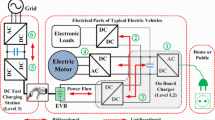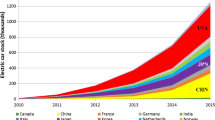Abstract
Recently, the electric vehicles (EV) are promoting rapidly in many big cities of China, but the charging problem has become a big obstacle for the development of EV. In this article, the demand of EV is determined on the basis of EV proportion and divided into 2 portions: (1) Centralized demand (2) Decentralized demand. The charging total mileage is determined based on the state of charge (SOC) and the orderly-free charging strategy is presented considering the demand of the users. Moreover, a new multi-objective teaching–learning based optimization (MOTLBO) algorithm is put forward to plan the quantity and location of the concentrated charging pile in the region considering the situation of the new city. Results showed that the performance of MOTLBO was promising and benefits can be achieved easily. As Compared to other methods, the method used in this article picks out the hierarchical planning idea firstly and addicts the man–machine interaction into the free-orderly charging strategy.











Similar content being viewed by others
References
Zhang, D., Jiang, J., Zhang, W., et al. (2015). Optimal configuration of charging spots for electric taxis. Transactions of China Electrotechnical Society, 30(18), 181–188.
Qian, B., Shi, D., Xie, P., et al. (2014). Optimal planning of battery charging and exchange stations for electric vehicles. Automation of Electric Power Systems, 38(2), 64–69+84.
Jia, L., Hu, Z., Song, Y., et al. (2015). Planning of electric vehicle charging stations in highway network. Automation of Electric Power Systems, 39(15), 82–89 and 102.
Liu, H., Li, R., Ge, S., et al. (2015). Multi-objective planning of electric vehicle charging stations on expressway based on dynamic traffic flow simulation. Automation of Electric Power Systems, 39(24), 56–62 and 79.
Hu, X., Martinez, C. M., & Yang, Y. (2017). Charging, power management, and battery degradation mitigation in plug-in hybrid electric vehicles: A unified cost-optimal approach. Mechanical Systems and Signal Processing, 87, 4–16.
Yang, T., Xu, X., Guo, Q., et al. (2017). EV charging behaviour analysis and modelling based on mobile crowdsensing data. IET Generation, Transmission and Distribution, 11(7), 1683–1691.
Mukherjee, J. C., & Gupta, A. (2017). Distributed charge scheduling of plug-in electric vehicles using inter-aggregator collaboration. IEEE Transactions on Smart Grid, 8(1), 331–341.
Chen, L., Nie, Y., & Zhong, Q. (2015). A model for electric vehicle charging load forecasting based on trip chains. Diangong Jishu Xuebao/transactions of China Electrotechnical Society, 30(4), 216–225.
Chen, Z., Xiong, R., Wang, C., et al. (2017). An on-line predictive energy management strategy for plug-in hybrid electric vehicles to counter the uncertain prediction of the driving cycle. Applied Energy, 185, 1663–1672.
Akhavan-Rezai, E., Shaaban, M. F., El-Saadany, E. F., & Karray, F. (2017). Managing demand for plug-in electric vehicles in unbalanced LV systems With photovoltaics. IEEE Transactions on Industrial Informatics, 13(3), 1057–1067.
Fernandes, X., Rebelo, J., Gouveia, J., et al. (2016). On-off scheduling schemes for power-constrained electric vehicle charging. 4OR, 15(2), 1–19.
Moon, S. K., & Kim, J. O. (2017). Balanced charging strategies for electric vehicles on power systems. Applied Energy, 189, 44–54.
Ji, L., Guo, Z., & Wu, Y. (2017). Computational and experimental observation of Li-Ion concentration distribution and diffusion-induced stress in porous battery electrodes. Energy Technology, 5(9), 1702–1711.
Hannan, M. A., Lipu, M. S. H., Hussain, A., & Mohamed, A. (2017). A review of lithium-ion battery state of charge estimation and management system in electric vehicle applications: Challenges and recommendations. Renewable and Sustainable Energy Reviews, 78, 834–854.
Zhang, X., Sun, Y., Yu, J & Li, X. Environmental/economic scheduling influence of vehicle-to-grid in micro-GRID. Boletín Técnico., 55(6):507–512.
Rao, R. V., & Waghmare, G. G. (2017). A new optimization algorithm for solving complex constrained design optimization problems. Engineering Optimization, 49(1), 60–83.
Li, D., Zhang, C., Shao, X., et al. (2016). A multi-objective TLBO algorithm for balancing two-sided assembly line with multiple constraints. Journal of Intelligent Manufacturing, 27(4), 725–739.
Vo-Duy, T., Duong-Gia, D., Ho-Huu, V., et al. (2017). Multi-objective optimization of laminated composite beam structures using NSGA-II algorithm. Composite Structures, 168, 498–509.
Li, L., Wang, W., & Xu, X. (2016). Multi-objective particle swarm optimization based on global margin ranking. Information Sciences, 375, 30–47.
Cheng, S., Zhao, L. L., & Jiang, X. Y. (2017). An effective application of bacteria quorum sensing and circular elimination in MOPSO. IEEE/ACM Transactions on Computational Biology and Bioinformatics, 14(1), 56–63.
Li, X., Deb, K., & Fang, Y. (2017). A derived heuristics based multi-objective optimization procedure for micro-grid scheduling. Engineering Optimization, 49(6), 1078–1096.
Author information
Authors and Affiliations
Corresponding author
Rights and permissions
About this article
Cite this article
Zhang, X., Sun, Y. & Yu, J. The EV Charging Piles Planning Based on the MOTLBO Algorithm. Wireless Pers Commun 102, 919–936 (2018). https://doi.org/10.1007/s11277-017-5116-0
Published:
Issue Date:
DOI: https://doi.org/10.1007/s11277-017-5116-0




